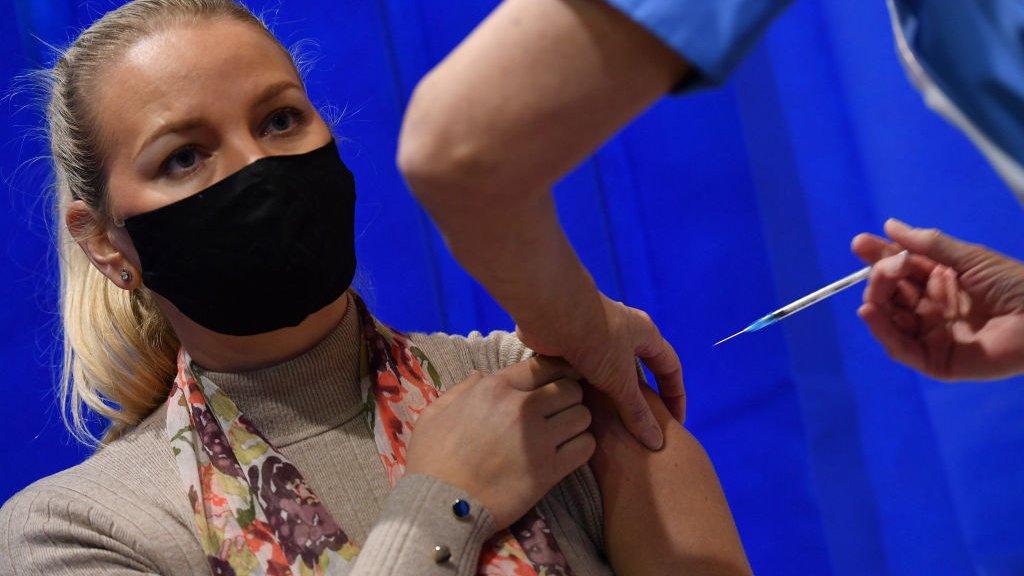Covid: Swansea hospital medics describe 'perfect storm'
- Published
"Covid patients are sicker during the second wave," says consultant
Medical staff at one of Wales' biggest hospitals are seeing a "perfect storm" of increasing numbers of patients, decreasing capacity and fewer staff.
Mark Poulden, an A&E consultant at Morriston Hospital in Swansea, said patients had been waiting outside in ambulances for 12 hours overnight.
He added there were 700 staff off sick with Covid across the health board.
Swansea Bay health board covers Neath Port Talbot, which has the highest rate of infection in Wales.
The warning came after the leader of Neath Port Talbot council said it was "inevitable" Wales would go into another lockdown "sooner rather than later".
Rob Jones blamed birthday parties and sleepovers for the spike in cases and said January would be "extremely difficult".
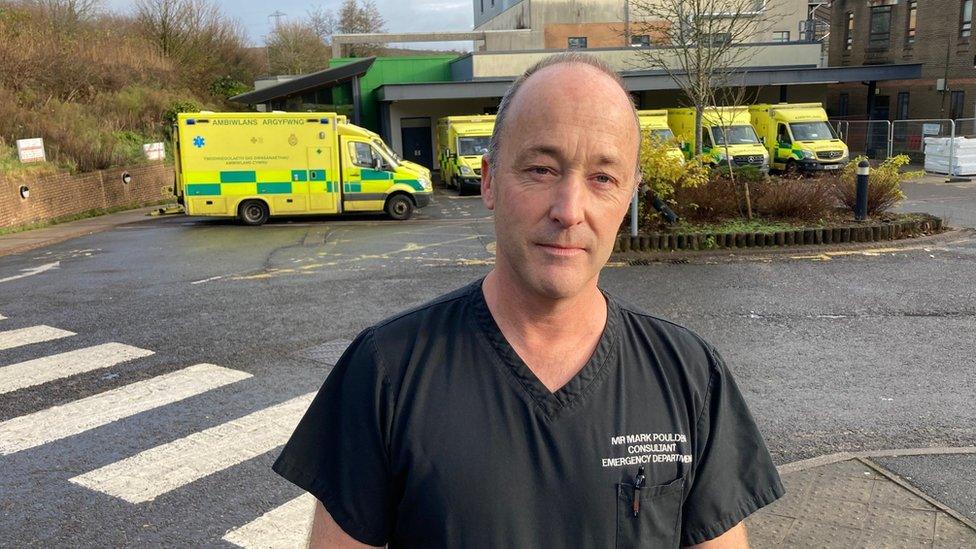
"Increasingly we are seeing staff succumbing to Covid," says A&E consultant Mark Poulden
Mr Poulden said: "We have been seeing an increasing number patients over the past few weeks and a lot of sick patients who are staying in hospital for longer."
He said said "all the beds are full, essentially", and there had been patients waiting for a bed "for over 24 hours".
"Increasingly we are seeing staff succumbing to Covid as well," he added.
"So it is the perfect storm we are describing - increasing patients, lack of capacity and less staff to deal with them."
Mr Poulden's colleague Peter Matthews, a consultant in the intensive care department, said there was currently "15 or 16" patients on ventilators, down from 20 over the weekend after a number of deaths.
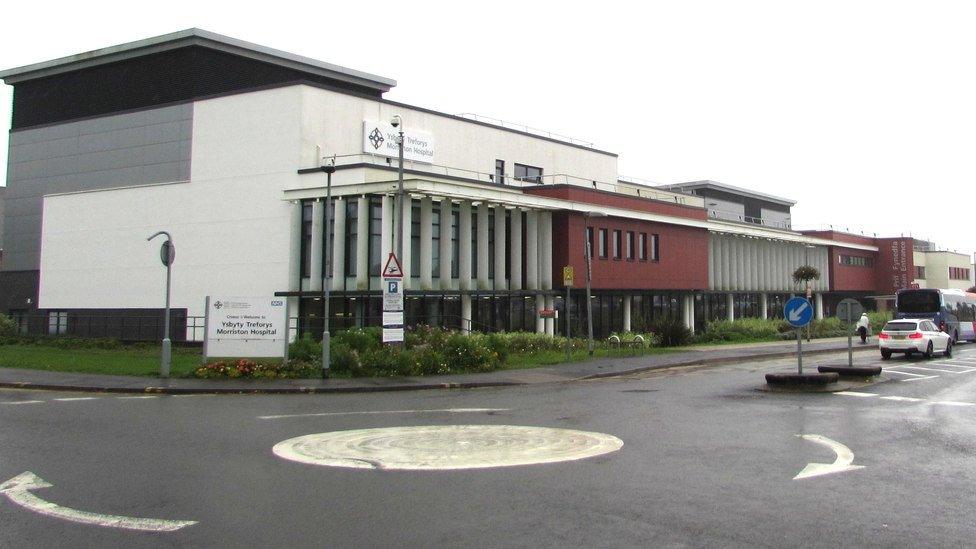
Morriston Hospital in Swansea is seeing a "perfect storm" as Covid cases increase in the area
Mr Matthews said there were fewer patients on the intensive care ward than during the first wave, but patients were "sicker" this time around.
"It takes an awful big toll on our staff, who are tired," he explained.
"There's a high number of sickness and the morale is not as good as it was during the first wave.
"And there's a lot of guilt from families who feel they may somehow be responsible for having passed the virus on."
Third wave
The chair of the Welsh Government's Covid-19 vaccine programme board said that a third wave of coronavirus is "definitely our concern".
Meanwhile, Health Minister Vaughan Gething said is was "possible" Welsh ministers would have to revisit the four nation's agreement on Christmas rules.
However he said he was "not convinced" that change to Christmas arrangements now "would lead to more people doing something different".
Allow X content?
This article contains content provided by X. We ask for your permission before anything is loaded, as they may be using cookies and other technologies. You may want to read X’s cookie policy, external and privacy policy, external before accepting. To view this content choose ‘accept and continue’.

Neath Port Talbot has the highest weekly Covid-19 case rate in Wales at 621.7 per 100,000 population.
Officials in Swansea Bay University Health Board warned case levels could soon reach "catastrophic levels" unless people follow social distancing rules.
Speaking to BBC Radio Wales' Breakfast with Claire Summers, Mr Jones said there is "some evidence" of community spread "particularly with households coming together".
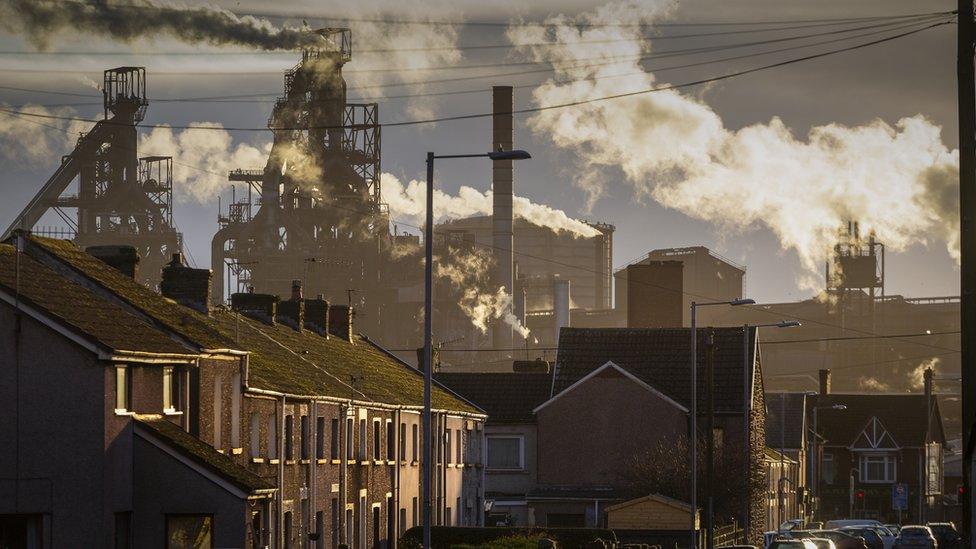
Neath Port Talbot currently has the highest weekly Covid-19 case rate in Wales
"The most affected age band is around the 40-49 age range followed by the 50-59, but then one of the lowest most consistent infections is the 0-9 and the 10-19," he said.
"On the lower age range we're looking at outside community activities, sleepovers.
"If we have a look at the adult age range, we're looking at birthday parties, social gatherings, adults in work settings and retail."
Mr Jones said: "Anything that will protect people, saves needless deaths and protect people that are vulnerable in the community has to take place."
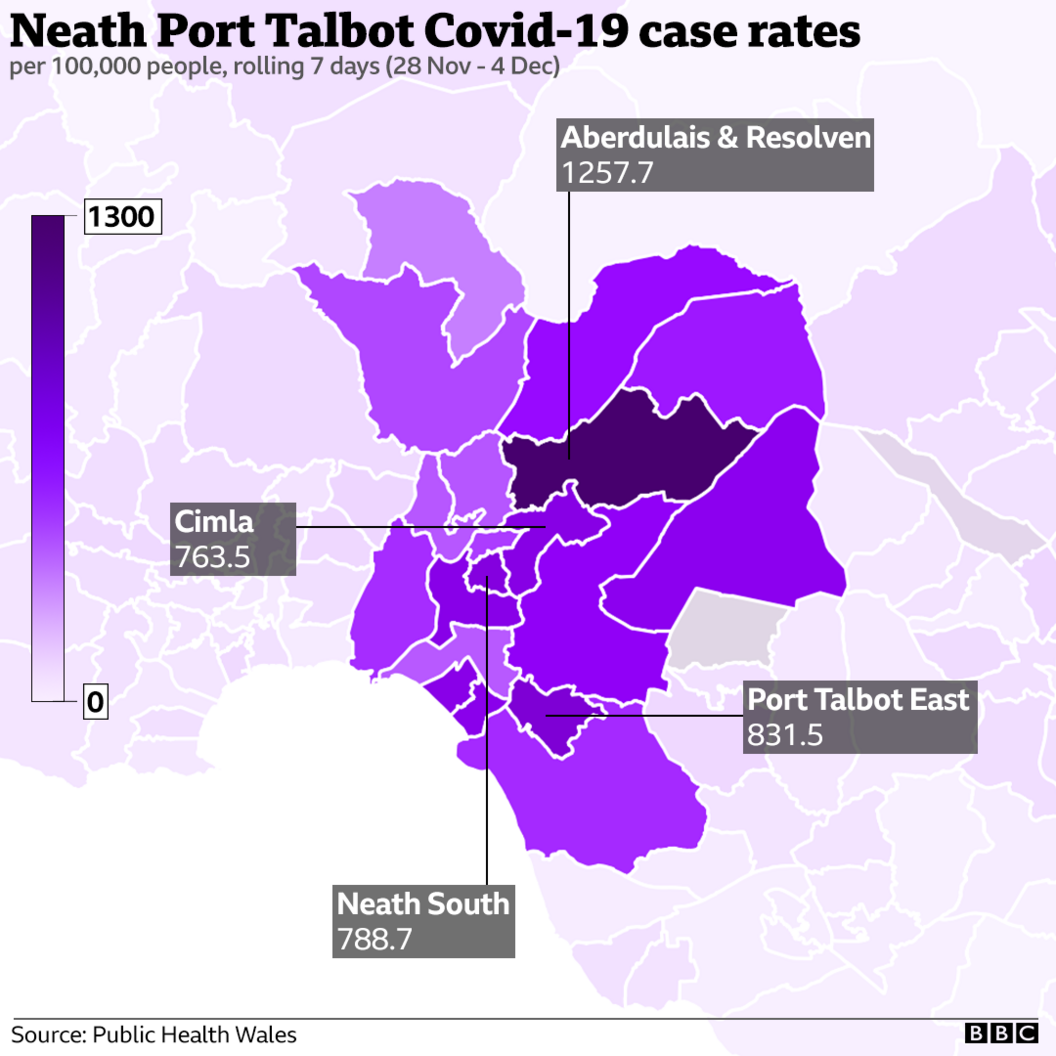

'New waves'
Dr Gill Richardson, the chair of the Welsh Government's Covid-19 vaccine programme board, said that a third wave of coronavirus is "very, very definitely our concern".
"[A third wave] is our fear, and unfortunately, in some areas of Wales, it is looking that way," she told BBC Radio Wales' Breakfast programme.
"Particularly, indoors and indoor mixing, of families that aren't in your bubble, in the run up to Christmas will just mean that infections will soar."
Dr Richardson said staff and health officials in Swansea Bay health board are "under great stress today".
"They are seeing numbers rise, and they are seeing - particularly in Neath Port Talbot - a huge rise in rates," she said.
"We always knew it was going to be like surfing the wave, and that new waves would come in, and until we can make sure that everybody is protected, we have all got to be really careful."
'Pretty bleak'
On Monday, Swansea Bay health board director Dr Keith Reid said the local health system will be "overwhelmed" if cases continue to rise at the current rate.
Jamie Jenkins, former head of analysis at the Office for National Statistics (ONS), said that the number of tests being carried out in Wales has risen by 54% in three weeks - not including the mass-testing in Merthyr Tydfil and the lower Cynon Valley - which has resulted in an increase in confirmed cases.
He said: "Things are looking pretty bleak at the moment with the number of cases and it only seems to be going one way."
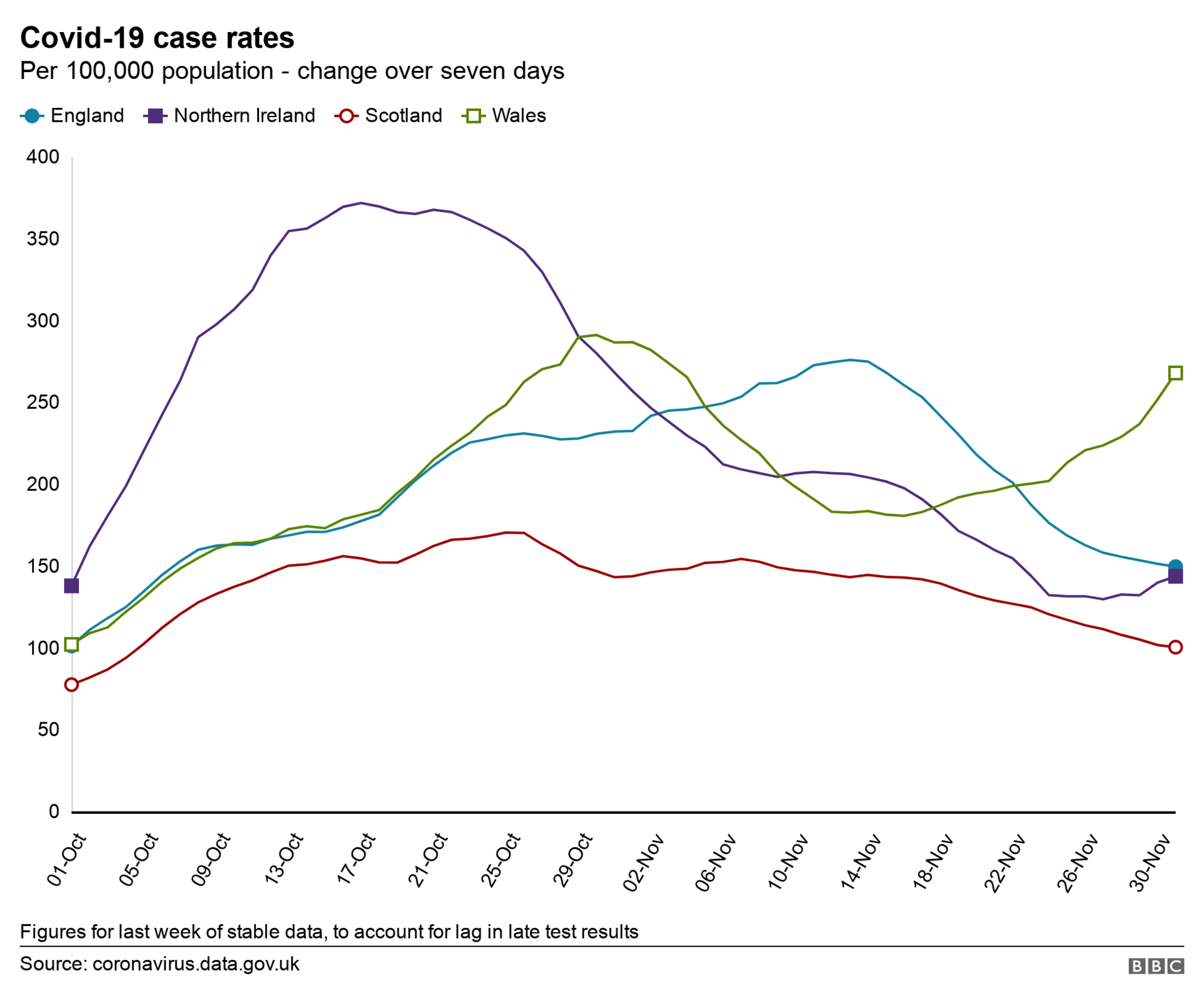

Wales' coronavirus case rate overtook England's on 23 November, two weeks after the firebreak ended and while England was locked down, and on 1 December had a seven-day case rate of 267.8 per 100,000 people, UK government statistics show.
That was compared to 149.5 in England, 143.6 in Northern Ireland, and 100.3 in Scotland. 149.5 in England, 143.6 in Northern Ireland, and 100.3 in Scotland.
Wales' health minister confirmed at a Welsh Government coronavirus briefing on Monday, that ministers were looking at whether further measures would be needed.
Will there be new restrictions?
Mr Gething told BBC's Today programme that is was "possible" that Welsh ministers would have to revisit the four nation's agreement on Christmas rules between 23-27 December.
However he said he was "not convinced" that change to Christmas arrangements now "would lead to more people doing something different".
"We are seeing real harm being done in the here and now," he said. "That is why we've had to make really difficult choices about hospitality and why we're going to have to make more difficult choices in the weeks to come."
Mr Gething told journalists at Monday's briefing that the Covid situation is Wales was "very serious" with the NHS under "considerable and sustained pressure".
"We're actively considering each day whether the measures we have are the right ones in place or not," he said.
He also said that it would "take a couple of weeks" for the latest measures on pubs, cafes bars and restaurants to have any impact on the rate of confirmed cases.
- Published7 December 2020
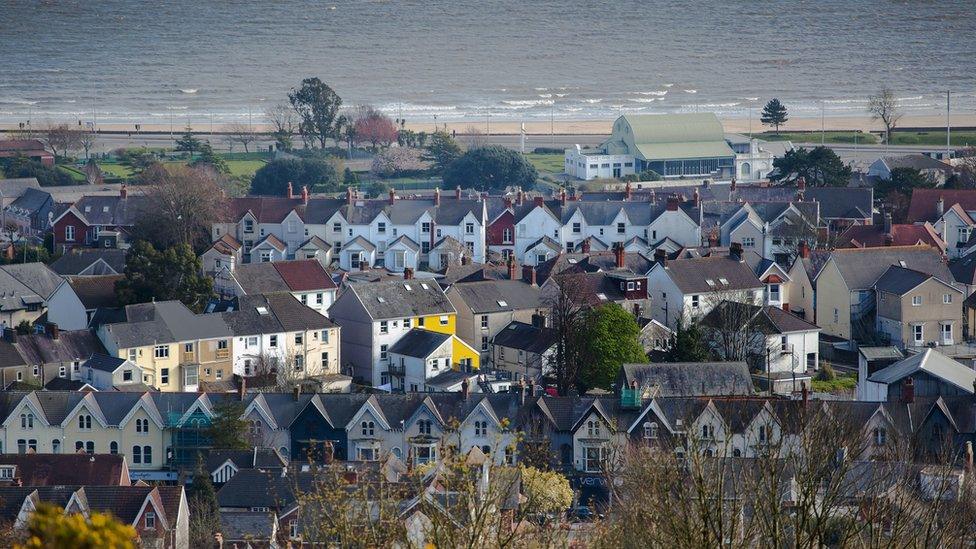
- Published8 December 2020
